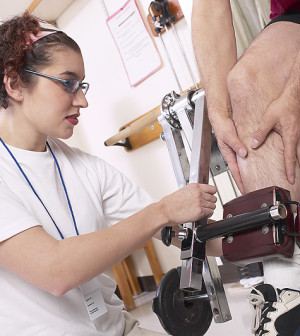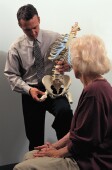- 10 Strategies to Overcome Insomnia
- Could Artificial Sweeteners Be Aging the Brain Faster?
- Techniques for Soothing Your Nervous System
- Does the Water in Your House Smell Funny? Here’s Why
- Can a Daily Dose of Apple Cider Vinegar Actually Aid Weight Loss?
- 6 Health Beverages That Can Actually Spike Your Blood Sugar
- Treatment Options for Social Anxiety Disorder
- Understanding the Connection Between Anxiety and Depression
- How Daily Prunes Can Influence Cholesterol and Inflammation
- When to Take B12 for Better Absorption and Energy
Vitamin D Supplements Won’t Strengthen Older Women’s Bones: Study


High doses of vitamin D do not appear to protect postmenopausal women from the dangers of osteoporosis, new research indicates.
“While high-dose vitamin D did indeed increase calcium absorption, the increase was only 1 percent and [it] did not translate into gains in spine, hip or total body bone mineral density,” said study author Dr. Karen Hansen.
In fact, Hansen, an associate professor of medicine at the University of Wisconsin School of Medicine and Public Health in Madison, noted that she and her colleagues “did not find any benefit of vitamin D, in either high or low dose, on muscle mass, two tests of muscle fitness or fall [risk].”
The team reported the results online Aug. 3 in the journal JAMA Internal Medicine.
Postmenopausal women face a greater than average risk for developing osteoporosis, according to the U.S. National Institute of Arthritis and Musculoskeletal and Skin Diseases. In fact, the study authors say almost half of postmenopausal women will experience some type of bone fracture resulting from low bone mass, low muscle mass and/or low bone density.
To explore the potential benefit of vitamin D supplementation on bone health, investigators focused on 230 vitamin-D deficient postmenopausal women. Most were white, and all were under the age of 75.
Between 2010 and 2013, the women were divided into three groups: a high-dose vitamin D group; a low-dose vitamin D group; and a dummy pill group.
For one year, those in the low-dose group received 800 IUs of vitamin D daily, while those in the high-dose group received 50,000 IUs of vitamin D twice a month.
By year’s end, the no-dose group saw their calcium absorption rate drop by a little more than 1 percent, while the low-dose groups experienced a dip of about 2 percent. In comparison, the high-dose group saw their rate climb by 1 percent.
While the overall vitamin D level across all three groups was ultimately pegged at about 21 nanograms per milliliter, the high-dose group saw their levels rise to 30 nanograms per milliliter, a level many experts consider more optimal.
But despite the differences, tests revealed that the high-dose group showed no advantage over either the low-dose or no-dose group with respect to spine health, total bone mineral density, overall muscle mass or physical mobility (such as being able to move from a sitting to a standing position).
Similarly, no differences between the groups were seen with respect to overall fall risk.
The researchers cautioned that the findings may not apply to non-white women, young adults, women over the age of 75 or men.
“I don’t believe that my study is the last and definitive word on vitamin D,” added Hansen, while noting that high-dose vitamin D supplements typically pose no harm, other than high blood calcium levels or possible kidney stones.
Still, Hansen said the study, which was funded by the U.S. National Institute on Aging, suggests that postmenopausal women fare just as well with lower overall vitamin D levels.
The bottom-line: “A low-dose supplement of between 600 to 800 [IUs] a day makes a lot of sense,” she said. “If you take that amount it’s very unlikely you will be vitamin D-deficient.”
But Dr. Rita Redberg, a professor of medicine with the University of California, San Francisco’s Philip R. Lee Institute for Health Policy Studies and editor of JAMA Internal Medicine, went a step further.
“I think this is the final, and negative, word on vitamin D supplementation,” she said. “There are a lot of women getting vitamin D blood tests and taking vitamin D supplements of various doses. This study suggests that those practices should stop. In other words, if you are going to start vitamin D to improve bone health, and if you are currently taking it for that reason, you can stop. I know of no other benefits for vitamin D supplementation.”
More information
There’s more on bone health and vitamin D at U.S. National Institute of Arthritis and Musculoskeletal and Skin Diseases.
Source: HealthDay
Copyright © 2026 HealthDay. All rights reserved.










